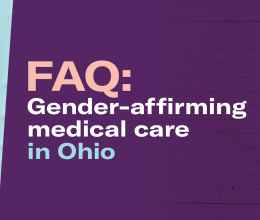CLEVELAND, OH – Today, the Supreme Court of the United States (SCOTUS) struck down the core of the federal Defense of Marriage Act (DOMA). In United States v. Windsor, the court found that DOMA unconstitutionally discriminates against legally married same-sex couples by excluding them from the hundreds of federal benefits and responsibilities given to legally married couples of the opposite sex.
The ACLU argued the case on behalf of Edie Windsor, an 83-year-old widow whose committed relationship with her legal spouse Thea stretched across four decades. When Thea died, Edie was forced under DOMA to pay a large federal estate tax on the home and savings they had shared—taxes she would not have had to pay if Thea had been a man.
“This is a historic moment for the LGBT movement,” said Susan Becker, professor, Cleveland State University - Cleveland-Marshall College of Law and past-president of the ACLU of Ohio. “Edie’s case was a textbook illustration of the harms caused by DOMA. It is our hope that today’s decision will mark the beginning of the end for government sanctioned discrimination against the LGBT community.”
As a result of United States v. Windsor, married same-sex couples living in the District of Columbia, or one of the 12 states that recognize their marriage, should now be eligible for the same federal protections and responsibilities afforded all other married couples.
For couples living in states like Ohio that do not recognize their marriage, access to federal protections will take more work. New legislation could eventually require the federal government to recognize all legally married LGBT couples, even if they live in a state that does not recognize their marriage. Meanwhile, public opinion on this issue has begun to shift rapidly, which should prompt states to begin repealing their discriminatory laws.
“The path to full LGBT equality will be longer in Ohio and the many other states with discrimination written into their constitutions,” said ACLU of Ohio Executive Director Christine Link. “Right now we have important work to do eliminating the very real housing and employment discrimination that LGBT Ohioans face every day, while continuing to push for marriage equality.”
“The ACLU has been in this fight for decades,” added Link. “Now the writing is on the wall. Public support for marriage equality is increasing every day and it is highest among young people. It may not happen tomorrow, but it will happen.”






